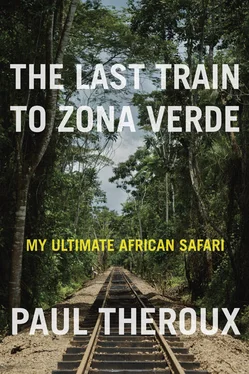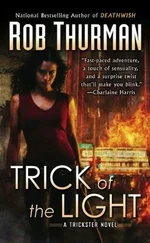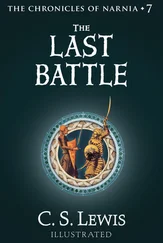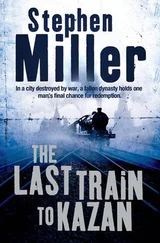This method works in most places. It does not work in Africa — though it did once. The followers in the footsteps of H. M. Stanley through the Congo, of David Livingstone through Angola, and of Samuel Baker through Sudan quickly discover that the trip is impossible in the Africa of today. The hinterlands are now controlled by heavily armed warlords, mercenaries, rebel armies, hostile tribes, secessionists, and religious fanatics — hard-line Islamists (Boko Haram, Ansar Dine) or crazed Christians (the Lord’s Resistance Army). Tim Butcher, who in Blood River recounts trying to re-create Stanley’s overland trans-Africa trip, from east to west, ended up flying.
I could have flown, but what’s the point? You don’t see anything from thirty thousand feet. And now I had an inkling of what I would find — cities that were indistinguishable from one another in their squalor and decrepitude. In the broken unspeakable cities of sub-Saharan Africa, the poor — the millions, the majority — ignored by their governments, live a scavenging existence in nearly identical conditions, in shacks, amid a litter of Chinese-manufactured household junk — plastic basins and buckets — and wearing Chinese-made clothes. They might have a cell phone, but in most cases it is little more than a maddening toy. They all suffer from the same inadequacies — food shortages, no plumbing, no clinics, no schools, no security — and the same illnesses — cholera, malaria, TB, and HIV/AIDS. They wait without much hope for deliverance, if not transformation. Even small, sedate, house-proud Windhoek had Katutura and its squatter camps; lovely Cape Town had Langa, Lwandle, Gugs, and other townships, equally bleak.
Though I was discouraged by the obstacles and appalled by the deaths of Nathan, Kalunga, and Rui, I had clung to my secret dream of traveling onward from Angola and ending up in Timbuktu. But soon two events shattered that dream. A secessionist coup by a faction of low-level army officers in Mali, fueled by rants from Al Qaeda in the Maghreb, meant that Mali was divided into two countries. Timbuktu in the north (a region as large as France) was now a stronghold of Islamic indignation and threats. Foreign travelers were being kidnapped and held for ransom. One had been killed. In time, this power struggle might be sorted out, I was told, but at the moment the fabled city was closed to the outside world.
Nigeria posed a more serious problem, but also a north-south divide. The Muslim-dominated states in the north — directly on my route — were tormented by the Boko Haram movement. The name in the Hausa language means “Western education is sinful.” The group’s official name is Jama’atu Ahlis Sunna Lidda’awati wal-Jihad, which in Arabic means “People Committed to the Propagation of the Prophet’s Teachings and Jihad.” In these northern states in Nigeria, ruled by Sharia law, the Boko Haram jihadis attacked Christians, Christian churches, non-Islamic schools, and just about anyone wearing Western clothes — trouser-wearing Nigerians and foreigners too.
I first heard about this hostile organization during my stay in Lubango, and had made notes to myself on its looming threat on the Day of the Dead, when I began seriously to wonder whether my trip was worth the trouble. Ever since I’d crossed the Angolan border, the question “What am I doing here?” had flashed in my mind. It was not a lament; it was a puzzled inquiry — most thoughtful people on earth ask themselves this question on a regular basis. *I had kept going, as this narrative shows, hoping for an answer. But around the time I was making my decision to put my head down and take the road north, Boko Haram became active again.
A tortuously argued op-ed in the New York Times by the historian and Africanist Jean Herskovits, “In Nigeria, Boko Haram Is Not the Problem,” explained that Boko Haram was “a peaceful Islamic splinter group” that had been exploited “for electoral purposes.” Video footage of the violent death in Nigerian police custody in 2009 of a Muslim cleric had radicalized the movement, though Herskovits pointed out that the “root cause of violence and anger in both the north and south of Nigeria is endemic poverty and hopelessness.”
She warned that, not mullahs and zealots, but criminal syndicates claiming to represent Boko Haram were terrorizing Christians, setting fire to their homes, and bombing hotels and markets, all to destabilize the country. We should not be too quick to label this Islamic terrorism, she wrote, or to hasten into “a rush to judgment that obscures Nigeria’s complex reality.” The complex reality was a narrow-minded president named Goodluck Jonathan, a southerner and a Christian, his corrupt politicians, and the Nigerian people, growing poorer and more numerous daily.
A rush to judgment was the last thing on my mind. But what about the reported violence? After I read the piece, which smacked of special pleading, I kept close track of Boko Haram outrages. Six days after the op-ed piece appeared, 20 people were killed by jihadis claiming to be Boko Haram — related. A week later, 174 murders, and two weeks after that a dozen more, all sectarian. Nigerian troops became involved, killing 20 Boko Haramists. And then, at weekly intervals for the next three months, there were suicide bombs, arson attacks on schools and churches, and targeted killings — the murder of Christians in Maiduguri and Jos. Thousands of deaths by now in the cities and on the bus routes of my proposed trip.
Professor Herskovits had argued for patience but perhaps had not anticipated the multiple massacres that followed her strangely mollifying piece. More recently, a number of scholars have warned the U.S. government against branding Boko Haram a terrorist organization because doing so would “internationalize the sect” and raise its profile, making it bolder. As a Nigerian terrorist group (or a collection of criminal gangs), the thinking went, it was dangerous only to Nigerians.
But, it seemed, dangerous to Western travelers too. The scholars’ line of reasoning (they wanted, among other things, to be in close touch with the Boko Haramists) seemed to me tendentious, self-serving, and unhelpful. If the root cause of the killings was not Islamic jihadism but “poverty and hopelessness,” there would be many more murders, because Nigeria was poor and hopeless. And for a traveler like me who had no choice but to pass overland through northern Nigeria, it hardly mattered whether I was threatened by a Western-hating jihadi or the armed members of a criminal syndicate, both of whom used the name Boko Haram.
Travelers often become celebrated for risking trips through dangerous places. I had taken risks in my time, and endured my own version of the anthropophagi, and the men whose heads do grow beneath their shoulders. And so I was faced with the ruined Congolese cities and the fanaticism of northern Nigeria. It struck me that if I proceeded on my way, it would have been a travel stunt, like riding a pogo stick through the desert. A daredevil effort, and to what end?
“Is it worth it?” Apsley Cherry-Garrard asks at the end of The Worst Journey in the World , in talking about the doomed polar trek by Robert Falcon Scott in the Antarctic. Is life worth risking for a feat, or losing for your country? To face a thing because it was a feat, and only a feat, was not very attractive to Scott; it had to contain an additional object — knowledge.
Traveling north through chaos — what would I find that I had not already learned? As an oil state, Nigeria much resembled Angola in its corruption and destitution. Lagos and Kinshasa were larger versions of Luanda. The rural areas on my route were blighted: idle youths, ailing villagers, beggars, rappers. The lessons I had learned so far were that an itinerary of urban squalor is unrewarding; travel is difficult, and sometimes impossible; a foreign traveler represents wealth, an opportunity for the thief or “social bandit”; and the repetition of squalor is ultimately so futile in its frightfulness as to be banal in the retelling. I imagined my onward journey to be no more than spirited slumming, the usual ordeal of rank smells and bad food, but without a redeeming feature, a toxic tour through the bowels of West Africa, along the Côte d’Ordure.
Читать дальше












